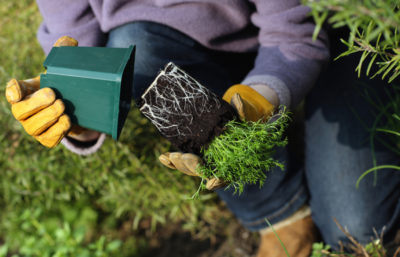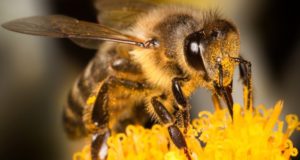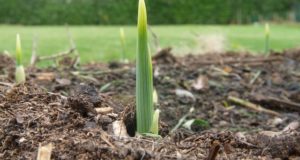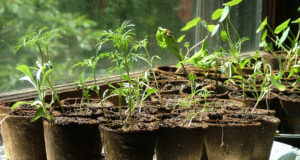It is not too late to plant your herb garden! If you are planting in July, provide extra shade and water to tender young plants.
Choose herbs for your gardens conditions.
You can change growing conditions, but it is easier to pick the right herbs for your environment. Tilling the soil carefully removes weeds and allows for soil amendments to be made. Till deeply if you are planting herbs that have deep tap-roots.
Raised beds are easy to maintain and offer excellent drainage. They are easy to weed and making improvements to your soil is easy.
Some people like to prepare new garden beds by using a technique known as lasagna gardening. Place layers of newspaper and organic material over your future garden site. Keep it moist. In a few weeks, grass and weeds will be smothered out and you can plant your garden.
If you don’t like waiting, you can till the old fashioned way with a shovel or tiller. In either case, remember that the most important gift that you can give your garden is to prepare your soil well prior to planting.
Adding organic matter such as compost or manure is vital to the success of your garden. Organic matter feeds plants, holds water, and keeps crops from frying in the hot sun.
I have spent the past few days mulching heavily. Before I mulch, I weed and trim any dead or unhealthy plant parts off. Be sure to feed and water well before mulching. If you have compost, this is a great time to apply it. Put a layer of compost under the mulch. I water well after applying the compost and then repeat watering after laying the mulch. Use as thick a layer of mulch that you can afford. It will keep moisture in, roots cool, and reduce the number of weeds you will have to pull in summer’s heat.
Please purchase eco-friendly mulches. Many cities and towns offer free mulch. Contact your town offices to see if that is available.
Some work now will pay off in healthier plants and easier living all summer long.
Manipulating the Environment
All plants need soil, light, nutrients, and water, heat. These are the conditions that we can manipulate. The easiest way to manipulate the environment is via container gardening.
Several commercial soil mixes are available. Choices are endless. Water-saving soil mixes, manure, and compost are readily available commercially as well. Do you want to grow organically? That option is available as well.
If you prefer to mix your own soil, here are some recipes.
The best soil is loam. Loam is rich in organic matter and has a neutral pH. It does not feel dry. Loam is not sticky; rather, it is loose and feels rich.
Sandy Soil
Sandy soil is well drained. Many Mediterranean herbs prefer sandy soil. Combine the following to make a sandy soil mix.
- 2 parts sandy soil
- 1 part perlite
- 1 part potting soil
Average Soil
Most herbs like this blend.
- 2 parts potting soil or loam
- 1 part peat moss, manure or compost
- 1 part sand or perlite
Rich, Moist Soil
Mints and other water-loving herbs like rich, moist soil.
- 1 part garden loam or potting soil
- 1 part peat, compost, or manure
- Decrease light with shade cloth, shade provided by other plants, arbors, fences, and vines.
- Increase light by thinning trees and shrubs. Move plants around in pots. Use grow lights for inside herb gardening.
Light
Water
Soaker hoses are best. Apply water when needed. Soil amendments such as compost and mulch conserve water. Planters are available which that have reservoirs. Hand water new plantings.
Herb plants can be obtained from the following sources:
- Seeds
- Division
- Purchase plants
- Root Cuttings
- Layering
If you can grow herbs using each of these methods, than you can grow virtually anything. These are the methods used for all herbs and garden plants except for those that are hybridized or cloned via tissue culture.
Growing your garden
- Water herbs 1/3 as often as vegetables
- Herbs do like to be fed. Bushier plants are more vigorous but tend to have less concentrated essential oils and flavor. If using a chemical fertilizer, 5-5-10 is best. I strongly recommend using organic practices.
Harvesting Herbs
Often you can begin harvesting within a month of planting. Herbs have the best flavor if you do not allow them to flower. Many flourish when harvested frequently. Do not cut into the woody parts of the plants when harvesting.
You can freeze herbs or dry them. Try pureeing herbs in oil and packing them in ice cube trays for fresh flavor next winter. Herbal vinegars are easy to make and store well.
Anyone can grow herbs. Decide what you would like to grow and get started on a wonderful flavor and medicine adventure!
 Off The Grid News Better Ideas For Off The Grid Living
Off The Grid News Better Ideas For Off The Grid Living





